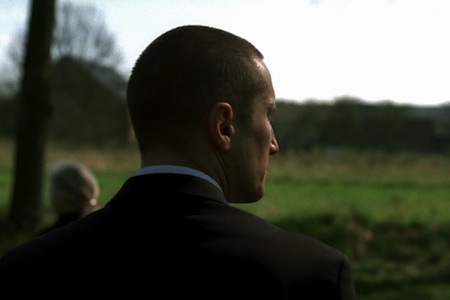Like many great dramas, Christian Petzold’s Jerichow begins with a tense story already in motion. The film’s opening moments, brimming with silent glances, stoic facial expressions, and sudden bursts of rage, chart the climax of a particularly fascinating narrative thread about two old friends realizing their relationship has come to an end. Ultimately, it’s a 7-minute prologue that becomes a stunning microcosm for the deceit, betrayal, and guilt that will dominate the rest of the film; the opening two minutes are shown above.
As white title cards play over a black screen, only the sound of church bells fills the dark void. The first sign of light comes suddenly with an over-the-shoulder shot of a bald-headed man named Thomas (Benno Fürmann) exiting his mother’s funeral. Before the audience has time to react, the sound of a car arriving resonates off-screen, causing Thomas to look up and break away from his family. Petzold then cuts to a long shot of a black car parked up the road and a mysterious man standing silently, an image reminiscent of Ed Harris and his ominous sedan in David Cronenberg’s A History of Violence. Two consecutive shot-reverse-shots connect the gaze of both characters before Petzold punches in closer to Thomas, now in full view of the camera. His look of quiet panic at the other man’s arrival is indicative of the delicate tension Petzold creates with wordless character exchanges. Seconds later, Thomas moves out of frame toward the car. (tramadol)

Once inside the vehicle, Petzold fixes the camera on Leon (André M. Hennicke), a serious-looking gangster dressed in a sharp suit staring intensely at Thomas from the back seat. As if he can feel the burn of Leon’s eyes on his neck, Thomas looks back for a moment, and the two men share another wordless exchange where their eyes do all the talking. But this time Petzold ends on a medium shot of Leon, who ultimately looks away out the window with the same expressive disappointment found on Thomas’s face the scene before.
While these two men are obviously not on good terms, there’s a sense of deep sadness in their expressions, as if both already regret what’s about to happen.
During the sequence that follows, set inside Thomas’s childhood home, a place marked with objects and trinkets connecting past and present, it’s revealed that Leon and his bodyguard have come to collect on an outstanding debt. The tense dialogue sequence expresses a mosaic of emotions in the most economical fashion, where each character’s hidden intentions are masked by subtle shifts in mood and voice tenor. Petzold creates perpetual disquietude that feels years in the making.
While these two men are obviously not on good terms, there’s a sense of deep sadness in their expressions, as if both already regret what’s about to happen.
The striking texture, sharp color, and smooth flow of the mise-en-scene in these scenes establish a sense of ease despite the tonal menace. Petzold is a master of genre misdirection, specifically the way characters submerge emotions to defy traditional roles and archetypes as they carefully deflect their real intentions. When Leon suddenly becomes enraged inside the house screaming, “Damn it!” mere seconds after consoling Thomas for the death of his mother, it’s a small but dynamic display of overt anger that disappears just as quickly as it arrives.
Eventually, these two men must face the inevitability of violence that this opening has foreshadowed all along, but Petzold’s treatment of the act is as effortlessly sudden as Leon’s ghostly arrival. Afterward, as Thomas lies in the grass outside his house having been knocked over the head by Leon’s bodyguard, his motionless body rests for hours into the night. Eventually, headlights from a passing car briefly illuminate Thomas’s obscured figure still unconscious, introducing a brand new narrative path. That this particular car and its passengers play pivotal roles for the duration of Jerichow not only proves Petzold’s fluid view of story and pacing, it instills a noir-infused vision of fate and comeuppance that brilliantly undercuts the art-film façade.
Glenn Heath Jr. is a film writer for Slant Magazine, The House Next Door, The L Magazine, Not Coming to a Theater Near You, and Little White Lies. He currently resides in San Diego, CA and can be found on twitter @Matchcuts.



